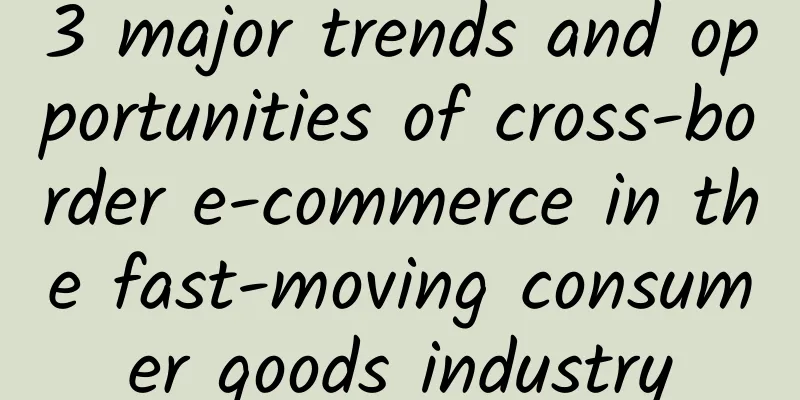3 major trends and opportunities of cross-border e-commerce in the fast-moving consumer goods industry

|
Foreign media reported that last year, online sales accounted for 90% of the growth in the CPG (fast-moving consumer goods) industry, which is enough to highlight its importance in the fast-moving consumer goods industry. In order to keep up with the trend of the times, fast-moving consumer goods giants have been constantly adapting to changes in consumer shopping habits, and they are also constantly occupying a share of the $60 billion market. Brands like Dollar Shave Club, whose online sales doubled that of Gillette in just three years, have been breaking out of the traditional FMCG growth model. Here are some of the major trends and changes that will continue to transform the FMCG industry in 2018 and beyond. 1. Consumers are buying more groceries and CPG products online than ever before According to the Food Marketing Institute, 49% of U.S. consumers purchase consumer packaged goods online, a significant increase from just a few years ago. According to research data, online grocery sales will account for 20% of all grocery sales and may become a billion-dollar market by 2025. Of the many market models, the online model—or more accurately, the online plus offline model—has the potential to provide better services to shoppers, for example in terms of price, convenience, and selection. Peter Freedman, managing director of the Consumer Goods Forum, said: “The level of competition in today’s market is providing shoppers with great deals, such as two-hour lead times and free delivery. 2. Amazon and e-commerce put a lot of pressure on supermarket giants Amazon’s acquisition of Whole Foods last year was a sign that the e-commerce wave had arrived and had entered what some see as the grocery delivery phase. Amazon Fresh, which now offers same-day delivery in a growing number of cities, has become Amazon’s fastest-growing program this year, with sales soaring 40%. Another survey by Coresight Research found that 59.5% of U.S. internet users purchased groceries from Amazon in the last year. The growth of Amazon Fresh and Amazon Pantry categories has forced grocery giants Walmart and Target to accelerate their own moves to open their grocery store aisles to online shoppers. Walmart plans to expand grocery delivery to more than 800 stores by the end of the year, while Target is piloting a same-day delivery program at select locations. 3. Future trends of omni-channel The underlying omnichannel trend, which leverages online and offline channels to better serve shoppers, has been around for years. Alibaba, for example, founded Hema in 2015. Smaller brands will also need to improve their sales methods by forming partnerships with large chains and improving their sales methods both online and in-store. Some brands that started in e-commerce, like Honest Company, have found success through distribution partnerships with major retailers like Walmart and Target. Dream Water is another direct-to-consumer success story, with its products now available at Walmart, CVS, and Walgreens. “Adopting an omnichannel strategy may sound tempting, but it’s difficult for many companies to do so,” Freedman said. |
Recommend
Mattel factory inspection, Mattel factory inspection process
Mattel is the world's largest toy manufacturer...
What is organic cotton? What are the requirements for organic cotton products?
Organic cotton is of great significance to protec...
Nike's sales decline is spreading to second- and third-tier cities
Recently, Nike has begun to lower its prices. In ...
How is Changshun Logistics? What services does Changshun Logistics provide?
How about Changshun Logistics? Guangzhou Changshu...
What is MyMall? What are the advantages of MyMall logistics?
What is MyMall? MyMall, as a strategic project of...
POLO factory inspection standards
POLO RALPH LAUREN operates around the world with e...
How do TOPHATTER sellers register? TOPHATTER seller registration process
How do TOPHATTER sellers join? Sell first, revi...
How is Black Friday e-commerce academy? What products and services does Black Friday e-commerce academy provide?
How about Black Friday e-commerce academy? "...
ShareSave--Xiaomi cross-border e-commerce
What is ShareSave? ShareSave is a new cross-borde...
How is Rogo.com? What services does Rogo.com provide?
How about Rogo.com? Rogo.com originated from the ...
Tips for auditors to ask questions during factory inspections
Many people will encounter many problems during f...
Conditions for applying for ISO17025 laboratory accreditation
What are the conditions for applying for ISO17025...
Seller Cloud—Professional SAAS ERP Store Management
What is Seller Cloud? Seller Cloud is a leading e...
What eBay logistics methods can be used? How to choose eBay logistics methods?
What logistics methods can be used by eBay? 1. Se...









